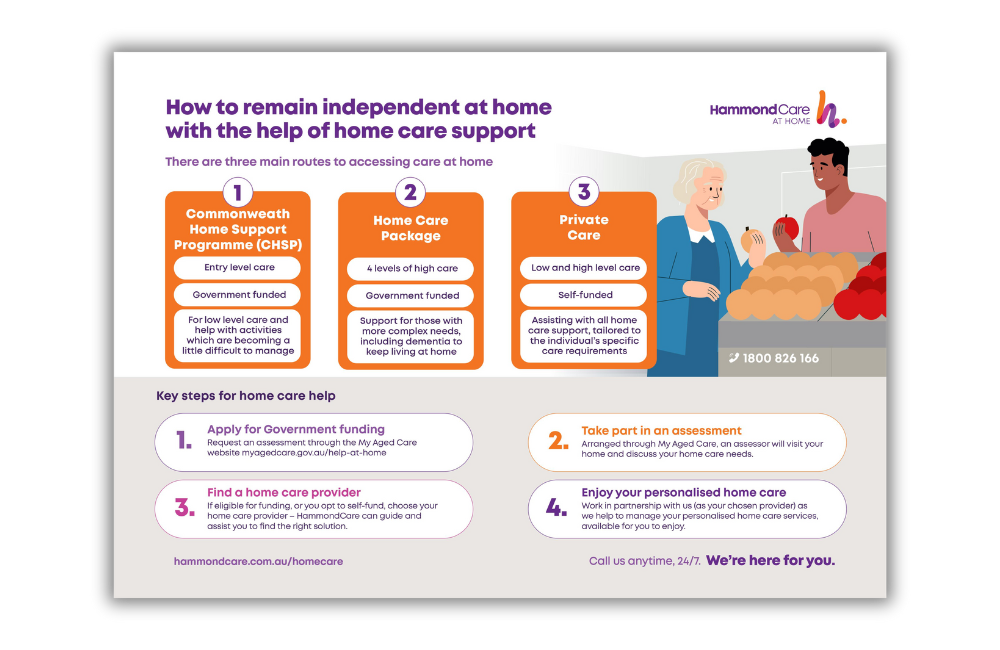The Relevance of Home Care in Disability Assistance: Exploring NDIS Registered Solutions
Home care is an essential aspect of special needs support, especially within the structure of NDIS signed up solutions. It offers crucial services that foster self-reliance and enhance total quality of life for individuals with disabilities. By using personalized support, these solutions deal with unique requirements and choices. The efficiency of home treatment counts on recurring communication with NDIS organizers. This vibrant connection exposes deeper understandings right into the transformative possibility of customized assistance. What successes and challenges arise in this evolving landscape?
Comprehending the Role of Home Care in Disability Assistance
Home treatment plays an important role in the support of people with disabilities, offering significant services that advertise independence and enhance top quality of life. It encompasses an array of support customized to meet the unique needs of each individual, consisting of individual treatment, family tasks, and mobility assistance. Trained caregivers supply friendship and emotional assistance, cultivating significant connections that battle social isolation.Furthermore, home care services are developed to adapt as scenarios alter, guaranteeing that individuals receive the suitable degree of care throughout their lives. This versatility enables the combination of new treatments or innovations that may emerge. By focusing on the individual's preferences and routines, home care empowers them to maintain control over their daily tasks. Eventually, the function of home care in impairment support is essential, as it not just gives practical support but also affirms the self-respect and freedom of those it serves.

Benefits of Personalized Assistance in the house
Personalized aid at home offers countless advantages customized to specific demands - home care package providers. By producing tailored assistance strategies, caretakers can significantly boost the independence of people with handicaps. This method not just advertises freedom but likewise promotes a feeling of self-respect and self-worth
Customized Assistance Strategies
Customized assistance strategies play a necessary role in improving the top quality of life for people with impairments. These tailored plans are developed to address the unique demands and choices of each individual, ensuring that assistance services straighten with their details goals and way of life. By including customers in the planning process, customized support plans cultivate a sense of ownership and empowerment. This individualized strategy permits caregivers to offer relevant assistance, whether it entails daily living tasks, social interaction, or skill advancement. Furthermore, customized plans can adapt to altering scenarios, mirroring the evolving requirements of the individual. Eventually, this individualized support boosts not only day-to-day working yet also psychological well-being, enhancing the importance of a tailored method in handicap support solutions.
Enhanced Freedom Opportunities
Individuals with disabilities profit considerably from customized aid at home, as it advertises enhanced self-reliance possibilities. Tailored assistance enables individuals to take part in daily activities with better self-confidence and autonomy. Home care solutions can include help with personal care, meal preparation, and household management, allowing clients to keep their choices and regimens. This individualized approach fosters a sense of control, empowering individuals to make options that reflect their distinct requirements and goals. Additionally, the convenience of home creates a familiar atmosphere, decreasing stress and anxiety and boosting psychological well-being. In general, customized assistance not only supports essential daily tasks however likewise cultivates an extra independent way of living, permitting people with handicaps to grow within their areas and attain better individual gratification.
Overview of NDIS Registered Home Care Solutions
NDIS signed up home treatment solutions include different kinds of support tailored to individuals with specials needs (support at home provider). Recognizing eligibility and access to these services is important for making the most of the benefits of NDIS assistance. This introduction will certainly highlight the crucial elements of home care under the NDIS framework
Types of Home Treatment
Home treatment solutions play an essential role in sustaining individuals with disabilities, providing a series of alternatives to satisfy diverse needs. NDIS signed up home treatment solutions include personal care, which helps people with day-to-day activities like showering and clothing. Domestic support helps keep a secure and tidy living environment, while respite care offers short-lived alleviation for main caretakers. Community gain access to solutions make it possible for engagement in social and entertainment activities, cultivating independence and link. In addition, nursing treatment supplies clinical assistance in the house, making certain health demands are satisfied. Treatment solutions, including work-related and physical rehabilitation, help in recovery and ability growth. Together, these numerous sorts of home treatment add substantially to improving the lifestyle for people with impairments.
Qualification and Accessibility
How can one access the crucial home care services offered under the NDIS? To receive these solutions, individuals should meet specific eligibility criteria outlined by the National Special Needs Insurance Policy Plan. Applicants must show a considerable and long-term disability that influences their day-to-day functioning. The procedure begins with submitting a Gain access to Demand Form, that includes documentation of the impairment and its effect on everyday life. When accepted, people obtain a customized strategy describing their required assistances, consisting of home treatment services. These services can be accessed via NDIS-registered service providers, that need to comply with strict top quality and safety and security requirements. Recognizing these actions assurances people can successfully navigate the NDIS system to get the required support for their home treatment needs.
Benefits of NDIS Assistance
Accessing vital support with registered services uses people with impairments a transformative chance to enhance their quality of life. NDIS registered home care services give customized support, guaranteeing that each participant's special requirements are met. These solutions include a variety of assistances, including individual treatment, movement aid, and healing services, all developed to advertise self-reliance and check my reference wellness. Furthermore, registered providers stick to rigorous quality standards, assuring a high degree of treatment and security. Individuals additionally take advantage of enhanced flexibility, allowing them to choose service delivery methods that ideal match their lifestyles. Ultimately, NDIS assistance promotes a feeling of neighborhood and empowerment, enabling people with specials needs to engage more fully in their day-to-days live and accomplish individual goals.
Customizing assistance to specific requirements is vital in handicap treatment, as each person's preferences and conditions differ considerably. The National Special Needs Insurance Policy System (NDIS) stresses the importance of personalized care plans that reflect the distinct objectives and demands of each individual. This technique allows caretakers to concentrate on details areas such as movement support, daily living abilities, and psychological assistance, guaranteeing that services are appropriate and efficient.
Enhancing Lifestyle Through Home Treatment
While many individuals with handicaps face unique difficulties, home care services can substantially improve their quality of life by supplying customized assistance in acquainted environments. These services cultivate self-reliance, allowing individuals to participate in daily tasks that promote self-worth and personal satisfaction. Via personalized treatment plans, home care service providers can address certain needs, whether it includes aid with individual hygiene, meal preparation, or medicine management.Moreover, home care facilitates social interactions, urging connections with friends and family, which are necessary for emotional wellness. By remaining in their own homes, individuals experience a sense of stability and continuity, lowering anxiousness connected with strange settings. On top of that, caregivers can offer friendship, assisting to minimize feelings of isolation. Overall, home care not just addresses physical needs yet also enhances the emotional and social measurements of life for individuals with disabilities, inevitably leading to an extra satisfying and satisfying presence.
Browsing the NDIS for Home Care Solutions
Guiding with the National Impairment Insurance System (NDIS) can substantially affect the efficiency of home care solutions for people with handicaps. Understanding the NDIS framework is vital for individuals seeking suitable funding for home care services. This procedure starts with identifying private demands and goals, which helps in customizing support plans that straighten with the individual's requirements.Navigating the NDIS includes acquainting oneself with the qualification criteria, application treatments, and the planning process. Participants should involve with NDIS organizers to review their particular circumstances and desired end results. This discussion ensures that the needed home treatment solutions, such as individual treatment, support with day-to-day living, and healing assistance, are included in their plans.Furthermore, remaining updated on NDIS policies and any kind of changes in financing can empower individuals to make enlightened selections regarding their home treatment options, inevitably improving their self-reliance and lifestyle.
Success Stories: Encouraging Lives Via Home Care
Home treatment solutions have actually changed the lives of numerous people with specials needs, demonstrating the extensive effect of individualized assistance. Sarah, a young lady with analytical palsy, obtained independence through tailored home care support that allowed her to take part and handle everyday tasks in area activities. Likewise, John, that has autism, benefited from a specialized caretaker that helped him develop social abilities and foster purposeful partnerships, enhancing his lifestyle. These success stories highlight exactly how home care not only satisfies physical demands but additionally advertises psychological health. Families report boosted comfort, recognizing their loved ones receive professional and caring support in an acquainted setting. As these examples illustrate, home care encourages individuals with disabilities to flourish, encouraging self-sufficiency and improving overall life contentment. The transformative impacts of such solutions highlight the value of home treatment in the wider context of special needs support.

Regularly Asked Inquiries
How Can I Find NDIS Registered Home Treatment Providers in My Area?
To locate NDIS registered home care companies in a certain location, people can visit the NDIS site, make use of the provider finder device, or get in touch with regional special needs assistance companies for referrals informative post and support.
What Certifications Should Home Care Employees Possess for Disability Support?
Home care employees for special needs support should ideally possess credentials such as a Certificate III in Individual Assistance, appropriate experience, solid communication abilities, compassion, and understanding of special needs rights and person-centered treatment techniques.
Are There Any Costs Connected With NDIS Registered Home Treatment Services?
Costs linked with NDIS registered home care solutions can vary based on private demands, provider, and the level of care needed. Participants must review their plans to comprehend specific funding and prospective out-of-pocket expenses.
Can Home Care Provider Accommodate Particular Social or Language Demands?

Exactly How Commonly Can I Modification My Home Treatment Assistance Plan?
Individuals can usually change their home treatment assistance strategy as needed, usually a minimum of annually or upon considerable life adjustments. Normal testimonials assure that the strategy stays pertinent and successfully addresses progressing individual situations and requirements. Educated caregivers supply companionship and psychological support, cultivating meaningful links that their website deal with social isolation.Furthermore, home care solutions are developed to adjust as circumstances change, making certain that individuals obtain the proper degree of treatment throughout their lives. Home treatment solutions can consist of aid with personal treatment, meal preparation, and family management, enabling clients to keep their regimens and choices. NDIS registered home treatment solutions include personal care, which helps individuals with everyday activities like showering and dressing. With personalized treatment plans, home treatment service providers can attend to particular demands, whether it entails support with personal hygiene, meal preparation, or drug management.Moreover, home treatment helps with social communications, motivating links with family and good friends, which are crucial for emotional health. Prices associated with NDIS registered home treatment solutions can vary based on individual requirements, service providers, and the level of treatment required.